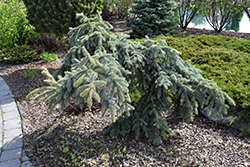40 feet
5 feet

2b
Blue Colorado Spruce;Colorado Blue Spruce
Weeping Blue Spruce is primarily valued in the landscape for its rigidly columnar form. It has attractive silvery blue evergreen foliage. The needles are highly ornamental and remain silvery blue throughout the winter.
Weeping Blue Spruce is a dense evergreen tree with a strong central leader and a narrowly upright and columnar growth habit. Its relatively fine texture sets it apart from other landscape plants with less refined foliage.
This is a relatively low maintenance tree. When pruning is necessary, it is recommended to only trim back the new growth of the current season, other than to remove any dieback. Deer don't particularly care for this plant and will usually leave it alone in favor of tastier treats. It has no significant negative characteristics.
Weeping Blue Spruce is recommended for the following landscape applications;
- Accent
- Vertical Accent
- Windbreaks and Shelterbelts
Weeping Blue Spruce will grow to be about 40 feet tall at maturity, with a spread of 5 feet. It has a low canopy, and should not be planted underneath power lines. It grows at a slow rate, and under ideal conditions can be expected to live for 70 years or more.
This tree should only be grown in full sunlight. It is very adaptable to both dry and moist growing conditions, but will not tolerate any standing water. It is considered to be drought-tolerant, and thus makes an ideal choice for xeriscaping or the moisture-conserving landscape. It is not particular as to soil type or pH, and is able to handle environmental salt. It is highly tolerant of urban pollution and will even thrive in inner city environments. This is a selection of a native North American species.













